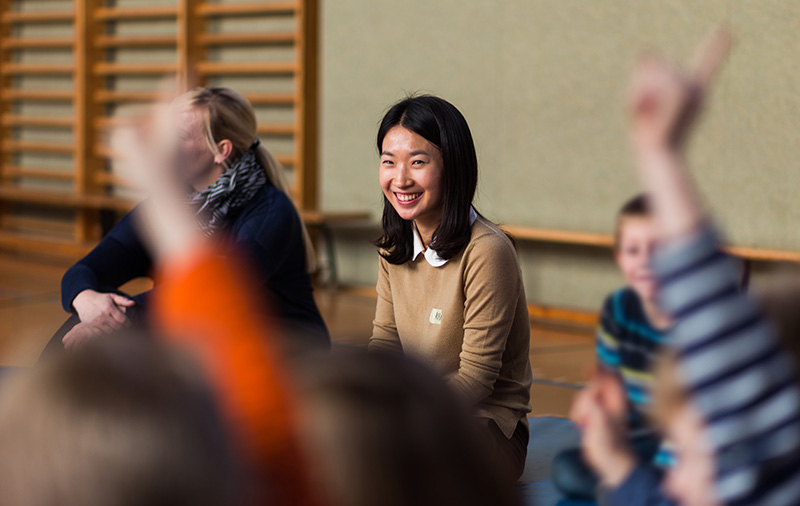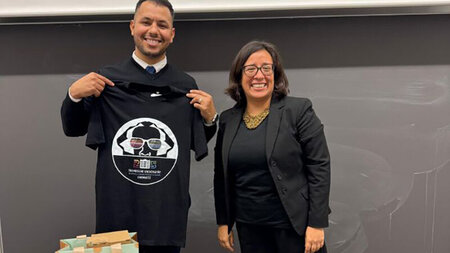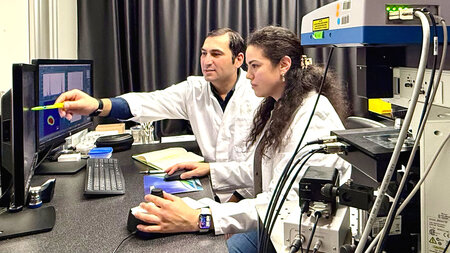Gain clarity about own thinking
Eleven questions for Junior Professor Dr. Minkyung Kim, who is the holder of the Junior Professorship for Teaching Children Philosophy in Primary Education since October 2014
-

Junior Professor Dr. Minkyung Kim seeks to maintain contact with schools – as here in the Valentina-Tereschkowa Primary School, where she along with students is in charge of a discussion group. Photo: Steve Conrad
Jun.-Prof. Dr. Minkyung Kim (31) holds the Junior Professorship for Teaching Children Philosophy in Primary Education at the Centre for Teacher Training since October 2014. In eleven answers, she gives the readers of “University News“ an insight into her career, goals and time in Chemnitz.
What do we actually understand under your area of specialization in “Teaching Children Philosophy in Primary Education”?
Under philosophizing with children one understands a philosophical conversation, in which the (elementary age) children think together about philosophical topics such as friendship, happiness, self-identity and so on. They learn to express their own opinions and arguments and to gain clarity about one’s own thinking. Philosophizing should also promote a democratic culture of discussion with the children by the ability to listen to others and to respect other opinions are practiced. The philosophy with children is mainly applied in ethics education, but also across disciplines.
TU Chemnitz is for me as a professor the right choice, because…
…I am offered a large space to be solely responsible for rebuilding much in my field and developing exciting research projects with other disciplines.
Could you say a few words about your academic career?
After school education in South Korea, I came to study in Germany. After one year of language learning phase, I started my master’s degree education in the University of Würzburg. Then I received my doctorate in the Graduate School of Humanities on “Philosophy with children as a way of intercultural learning”. As of October 2013, I first worked for a year as a research assistant until I received the current position.
Describe your study time in about 15 words.
A collection of coincidences and events that still have made sense at the end.
Did you have role models during your studies, who encouraged you to pursue a scientific career?
At the beginning of my studies, the good students in higher semesters were exemplary for me, especially those who came from other countries, but spoke excellent German and independently mastered their living and studying in Germany. Of course, there were and are many academics that I respect and from whom I try to learn something new. However, I cannot name a specific role model.
What advice would you give to young students and graduates?
Frustration is also part of the studies. It is important to appreciate the entire study period as a period for both, the mental and personal development. Use the time and spend a semester abroad or the like, and take a fresh look on the familiar things!
What would you like to achieve in teaching for the future?
That students, future teachers, have a philosophical ethos, and are curious, open and can question themselves critically.
Which impact do you make in the research at TU Chemnitz?
My main motivation is to operate a scientifically and socially relevant research through interdisciplinary exchange and cooperation with practitioners. From a content perspective, on the one hand, I am interested in understanding children’s way of thinking, and on the other hand, enable children to be open and deal respectfully with one another despite disparities in the ethics lessons.
There are around 45,000 professors at German universities. What sets you apart from others?
What formally sets me apart from others – is the fact that I am the holder of the Professorship which carries a unique name nationwide.
Which place do you show your guests the most in Chemnitz?
The Karl Marx monument, although Marx is supposed to have never been in Chemnitz, and of course, the magnificent Wilhelmian and Art Noveau district of Kaßberg.
How do you play a part in the life of the city?
On the one hand, in my work, I’m in a lively exchange with external training providers and schools in Chemnitz. On the other hand, I try to provide advice to the foreign students on my own experiences with the living and studying conditions in Germany.
Further information about professorship at: https://www.tu-chemnitz.de/zlb/professuren/philo_mit_kindern.php
(Translation: Nataliia Boiko)
Katharina Thehos
27.01.2015




